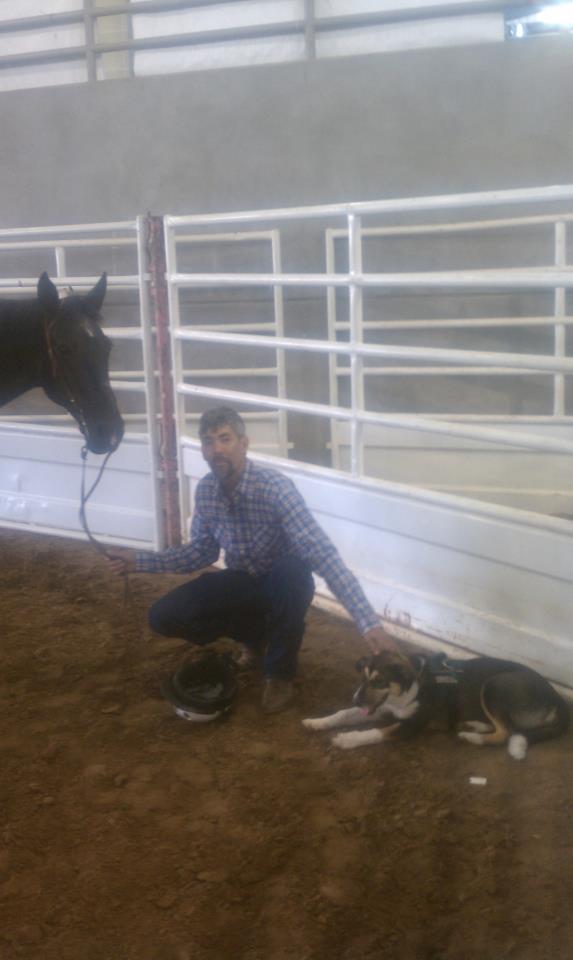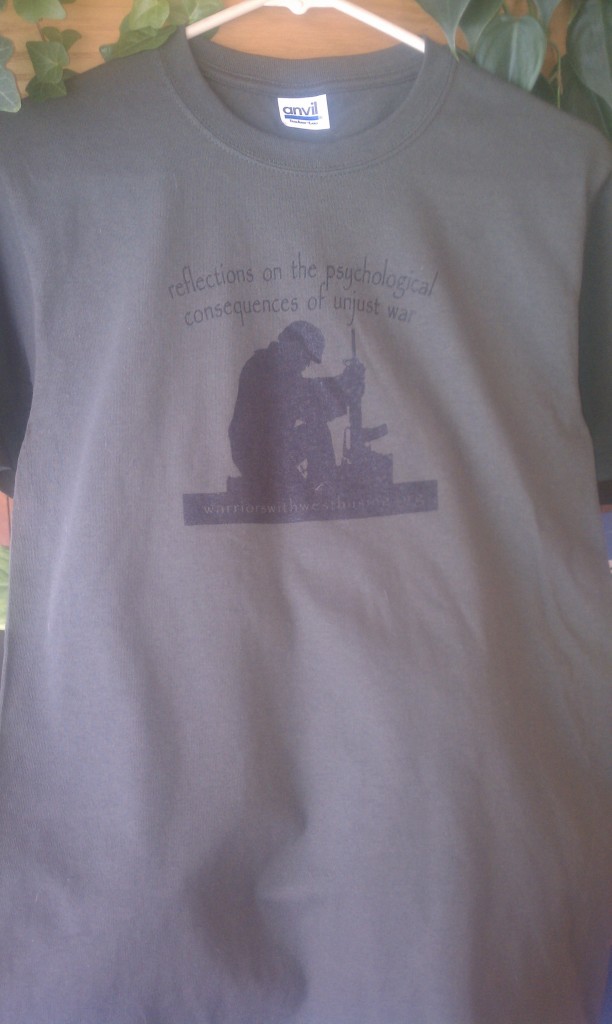Outward Bound for Veterans helps thousands of returning service members and recent veterans readjust to life at home through fully funded wilderness courses that draw on the healing benefit of teamwork and challenge through use of the natural world. I highly encourage veterans going through readjustment to contact OB and sign up for a course. It could be the most important thing you do for yourself.
Listening Horse: This non-profit program has served as a point of light for me in a world gone dark. The program director, Gus, a Vietnam vet, kept telling me that I had to get a horse. It was up to me to discover that a dog could be a horse. That dog is Abigail, from the Navajo Nation, trained to step lightly and carry no stick. She is teaching me the ways of peace and keeping me safe. Here is an article I wrote about Listening Horse.
Listening Horse is a horse therapy program based in Santa Fe, New Mexico that helps wounded veterans and others reconnect with their spirit, their humanity, and their will to live. Listening Horse is the sole Professional Association of Therapeutic Horsemanship International (PATH Intl.) Equine Service for Heroes program currently active in New Mexico. Gus, director of Listening Horse and certified therapeutic riding instructor since 2003, recognizes that the most important aspects of the program are the horses, their connection to the participants, and program safety.
Promise, Zorro, Sugar, Doc, Jack, Concho and Socorro are the horses available in the program. Because of the unique philosophy of Listening Horse, the horses are allowed to exist in as natural a state as possible, which means they are not shoed, and for purposes of riding, a simple hackamore is used rather than a bit.
Listening Horse adheres to all the safety guidelines of PATH Intl., which include the use of helmets and the presence of a primary and assistant instructor at all times. Additionally, a former VA physician, Dr. Como, assists Listening Horse with monitoring and assessing the safety of participants as they progress through the program.
Wounded and struggling veterans and members of the public often rely on drugs (prescription or otherwise) and destructive behavior to manage their conditions and escape their pain and anguish. Listening Horse provides an alternative, known informally as the “Third Herd Way.” (The term “third herd” comes from the practice of military units referring to their third platoon as “third herd,” a term meant to evoke the sense of unity, trust, and acceptance often present in a platoon of close-knit soldiers.)
Typical animal therapy, including horse therapy, is intended to connect the participant with the mindset of the animal. A relaxed dog or relaxed horse can have immense benefits on those experiencing stress, trauma, and pain. But these are often short-term benefits, lasting only so long as the animal is near at hand.
By contrast, the “Third Herd Way” is dedicated towards achieving long-term healing. It does so by acknowledging that veterans and members of the public can work at creating lasting and durable bonds with horses so powerful that a transformation is possible: over time and with persistent cultivation of “mindfulness,” the veteran can gain acceptance into the herd, a vibrant and healthy reality grounded in the present moment and not in past trauma.
The “Third Herd Way” recognizes principles long understood by Native Peoples but largely overlooked in the Western world: that animals inhabit a world that has grown increasingly apart from our own, as we have become increasingly denatured through our modern lifestyles. For the “Third Herd Way” to work, the world of horses must be recognized as no less precious than our own, with their sense of reality just as viable as our own, etc.
Listening Horse is predicated on the belief that we can heal ourselves through persistently courting this beautiful and alternate dimension of the animal experience, which is grounded in the present moment. To this end, every veteran is expected to approach the horse on the horse’s terms. By doing so, the veteran begins to enter the reality of the horse and actively form a meaningful bond with them.
The experience of this bond may result in personal transformation. For some, it may be the first time they are assisted into the saddle of a horse they have bonded with, and realize the exhilaration of doing something they never thought possible.
For others, it may be the first time they ride bareback with the reins slack in the hands, and feel an absolute sense of oneness with the horse, grounded in the present moment and filled with trust. It is here in this dimension that lasting healing may occur.
PAWS AND STRIPES: Paws and Stripes is a non-profit organization in Rio Rancho, NM that works to provide service dogs for veterans suffering from PTSD and TBI. The dogs and veterans undergo a roughly 6-month training program together. The dogs are obtained only from animal shelters. Veterans may also undergo training with a dog currently living with them provided the dog is deemed suitable by the trainers. It is the aim of the organization to provide these dogs and this training at no cost to the veteran. Because they have a two-year wait list, you may have to end up getting a dog and training it yourself, which is not uncommon, provided you know what you are doing, or know where to look to get started. I scoured the web and other resources to assemble my own training regiment. Since my philosophy on animal therapy came by way of Listening Horse, I was never intending to “break” AB of being a dog (as can be the result with some training programs.) For this reason, AB remains–like a horse, like Promise–a wild thing I was fortunate to befriend, and fortunate to share my life with.
DVR-6 is an action and advocacy team specialized in the recovery and aid of homicidal/suicidal veterans in the backcountry. DVR-6 members are proficient in tracking, wilderness survival, first aid, PTSD and TBI issues, and various non-lethal doctrine and techniques. The driving force behind DVR-6 is the notion that veterans who become dysfunctional and dangerous still merit a humane response. DVR-6 functions to save lives, not end them.
COMBAT PAPER: The Combat Paper Project utilizes art making workshops to assist veterans in reconciling and sharing their personal experiences as well as broadening the traditional narrative surrounding service and the military culture. Through papermaking workshops veterans use their uniforms worn in combat to create cathartic works of art. The uniforms are cut up, beaten into a pulp and formed into sheets of paper. Veterans use the transformative process of papermaking to reclaim their uniform as art and begin to embrace their experiences in the military.
U.S. Department of Veterans Affairs: Don’t try and figure out the website. The best thing to do is go to a Vet Center or Regional Benefit Office and speak to somebody in person. You will have to be very patient because you are dealing with a government bureaucracy that moves slowly. It can take several weeks to get an appointment to start getting treatment. If you are feeling desperate and need immediate assistance, call the hotline at 800-273-8255.
DAV: The 1.2 million-member Disabled American Veterans is a non-profit organization dedicated to building better lives for America’s disabled veterans and their families.
Ranger Against War: Another sister blog in a similar vein.
T-Shirts: If you are interested in purchasing a t-shirt to support this blog, please send a check or money order for $12 along with your mailing address and desired size (S, M, L, XL) to:
Warriors With Westhusing, C/O Alex Limkin, 413 Central Ave. NW, Albuquerque, NM 87102




Hi,
I have been a “silent”’follower of yours since 2012, how I found your site was rather interesting, I cannot go into details publically but it was to find answers to a huge problem.
I was heart broken years ago when the news came out about Col Westies ( medics called him that) death but it was hush hush, finally knowing the truth years later was such a relief but still… anger.
I truly pray I am able to be at this year’s skywalk, I need closure for him, and for so many others.
I am in need of some military law information desperately
Dear Mr. Limkin,
I read your article in Jan. 19-25 issue of the Alibi. I was very intrigued and obviously touched by the article, perhaps because it is my nature to have human compassion. Or perhaps more so because I was in love a man who served in the Iraq war and suffers from PTSD. My support and love for him did not meet his needs, unfortunately, our relationship did not survive. So when I read stories or see in the news about former military men and women who do the unthinkable, it saddens me to continuously read about the limited services that are attainable by our government, our communities. I just wanted to say your article was very well written and wish you much success in continuing your story, which must be read and heard.
Lastly, go Aggies!! Proud to read you went to NMSU. I am an Alum plus I worked there for 16/17 years.
Best,
Karen